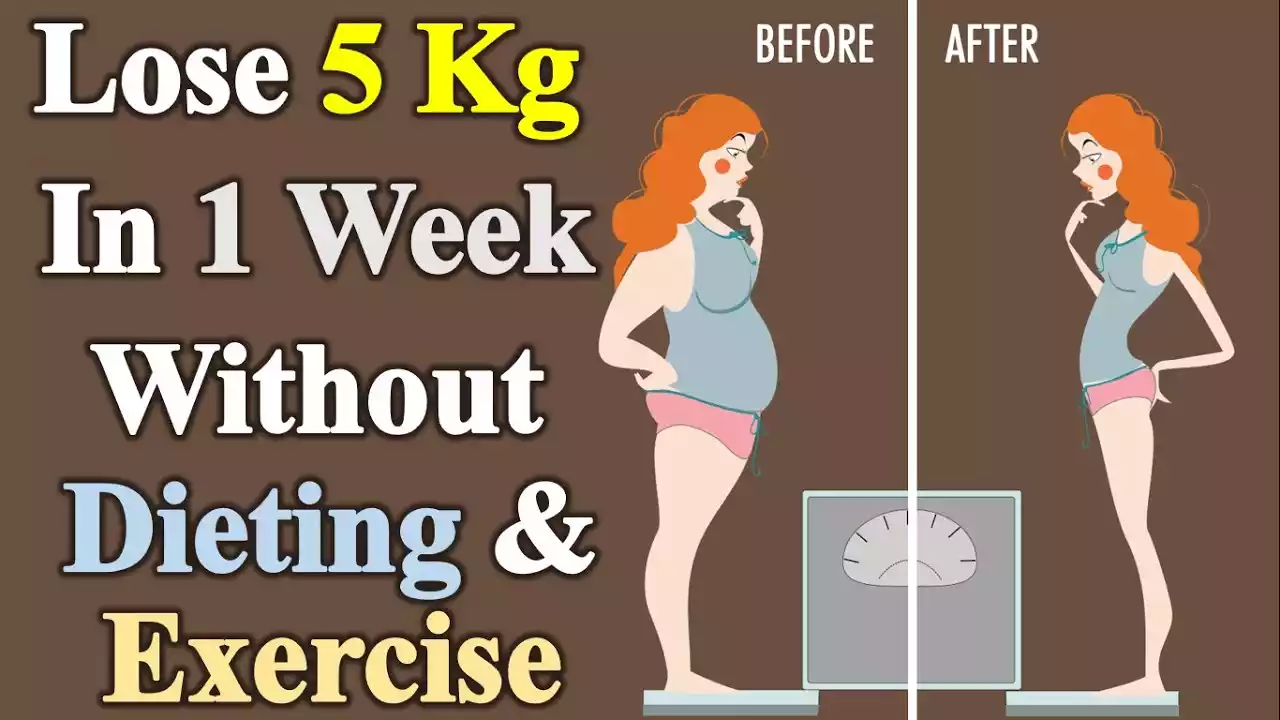How to Lose Weight in 1 Week Without Exercise: A Comprehensive Guide
Weight Loss in 1 Week Without Exercise:Losing weight is a goal many of us share, but the idea of hitting the gym or committing to a rigorous exercise routine can feel overwhelming, especially if you’re short on time or energy. The good news? You don’t necessarily need to sweat it out to shed a few pounds. With the right strategies, it’s entirely possible tolose weight in just one week—without exercise. This article will guide you through practical, science-backed methods to achieve your weight loss goals, all while keeping things simple and sustainable.
Understanding Weight Loss: The Basics
Before diving into the how, it’s important to understand the why. Weight loss fundamentally boils down to one principle: creating a calorie deficit. This means consuming fewer calories than your body burns in a day. While exercise is a great way to burn calories, it’s not the only way. By focusing on your diet, lifestyle, and habits, you can create that deficit without ever stepping foot in a gym.
For example, let’s say your body burns 2,000 calories a day just by existing (this is called your basal metabolic rate). If you consume 1,500 calories daily, you’ve created a 500-calorie deficit. Over a week, that adds up to 3,500 calories—equivalent to about one pound of fat lost. This is the foundation of weight loss, and it’s entirely achievable without exercise.
1. Prioritize Portion Control
One of the simplest ways to cut calories without feeling deprived is to practice portion control. Research shows that people tend to eat more when served larger portions, a phenomenon known as the “portion size effect.” By simply reducing the amount of food on your plate, you can significantly lower your calorie intake.
How to do it:
- Use smaller plates and bowls to trick your brain into thinking you’re eating more.
- Measure servings using your hand as a guide: a fist-sized portion for carbs, a palm-sized portion for protein, and a thumb-sized portion for fats.
- Avoid eating straight from the package, as it’s easy to lose track of how much you’ve consumed.
Real-life example: A study published in the American Journal of Clinical Nutrition found that participants who used smaller plates ate 22% less food than those who used larger plates. Small changes, big results.

2. Focus on Nutrient-Dense, Low-Calorie Foods
Not all calories are created equal. Foods high in fiber, protein, and water content can keep you full longer, making it easier to stick to your calorie goals. On the other hand, processed foods and sugary snacks are calorie-dense but nutrient-poor, leaving you hungry and unsatisfied.
What to eat:
- Vegetables: Leafy greens, broccoli, zucchini, and cucumbers are low in calories but high in volume and nutrients.
- Lean proteins: Chicken breast, turkey, tofu, and eggs help preserve muscle mass and keep you full.
- Whole grains: Quinoa, brown rice, and oats provide sustained energy without spiking your blood sugar.
- Healthy fats: Avocados, nuts, and olive oil in moderation can curb cravings and support overall health.
Expert insight: Dr. David Ludwig, a Harvard professor and obesity researcher, emphasizes the importance of choosing whole, unprocessed foods. “These foods naturally regulate your appetite and reduce the likelihood of overeating,” he explains.
3. Stay Hydrated
Water is a secret weapon for weight loss. Not only does it keep you hydrated, but it can also help control hunger and boost your metabolism. Sometimes, our bodies mistake thirst for hunger, leading to unnecessary snacking.
Tips for staying hydrated:
- Start your day with a glass of water.
- Drink a glass before each meal to help control portion sizes.
- Flavor your water with lemon, cucumber, or mint if plain water feels boring.
Did you know? A study in Obesity found that participants who drank 500 ml of water before meals lost 44% more weight over 12 weeks than those who didn’t.
4. Cut Back on Sugar and Refined Carbs
Sugar and refined carbs are major culprits when it comes to weight gain. They cause rapid spikes and crashes in blood sugar levels, leading to increased hunger and cravings. By reducing your intake, you can stabilize your energy levels and reduce calorie consumption.
How to reduce sugar:
- Swap sugary drinks for water, herbal tea, or black coffee.
- Choose whole fruits over fruit juices or desserts.
- Read food labels to avoid hidden sugars in sauces, dressings, and packaged foods.
Case study: A 2019 study in BMJ found that reducing sugar intake led to significant weight loss in participants, even without other dietary changes.
5. Get Enough Sleep
Sleep is often overlooked in weight loss discussions, but it plays a crucial role. Poor sleep disrupts hormones that regulate hunger (ghrelin and leptin), making you more likely to overeat. Aim for 7-9 hours of quality sleep each night to support your weight loss efforts.
Tips for better sleep:
- Stick to a consistent sleep schedule.
- Create a relaxing bedtime routine, such as reading or taking a warm bath.
- Avoid screens and caffeine at least an hour before bed.
Statistic: According to the National Sleep Foundation, people who sleep less than 6 hours a night are 30% more likely to become obese than those who sleep 7-9 hours.
6. Practice Mindful Eating
Mindful eating is about paying attention to what and how you eat. It helps you tune into your body’s hunger and fullness cues, preventing overeating. This approach can be especially helpful for emotional eaters or those who tend to eat out of boredom.
How to practice mindful eating:
- Eat slowly and savor each bite.
- Avoid distractions like TV or smartphones during meals.
- Pause halfway through your meal to assess your hunger level.
Expert opinion: Dr. Susan Albers, a psychologist and mindful eating expert, says, “Mindful eating helps you break free from autopilot eating habits and make more intentional food choices.”
7. Manage Stress
Chronic stress can lead to weight gain by triggering the release of cortisol, a hormone that increases appetite and promotes fat storage, particularly around the abdomen. Finding healthy ways to manage stress can support your weight loss goals.
Stress-reduction techniques:
- Practice deep breathing or meditation.
- Engage in hobbies you enjoy, like reading or gardening.
- Spend time in nature or with loved ones.
Real-life example: A 2018 study in Health Psychology found that participants who practiced stress management techniques lost more weight than those who didn’t.
Conclusion: Small Changes, Big Results
Losing weightin one week without exercise is entirely possible when you focus on creating a calorie deficit through smart dietary choices and lifestyle adjustments. By prioritizing portion control, choosing nutrient-dense foods, staying hydrated, and managing stress, you can achieve meaningful results without stepping foot in a gym.
Remember, weight loss is a journey, and small, consistent changes often lead to the most sustainable outcomes. While this guide is designed to help you lose weight in a week, these strategies can also serve as a foundation for long-term health and wellness. So, take it one step at a time, and celebrate every small victory along the way. You’ve got this!
(Read the latest news of the country and the world first on TalkAaj (Talk Today News), follow us on Facebook, Twitter, Instagram and YouTube)













